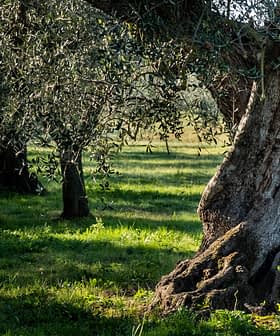The first Cretan Olive Oil Competition was held in the laboratory of organoleptic evaluation at the Union of Agricultural Cooperatives in Rethymno, Crete, Greece on March 21 – 22, 2015. This competition, which succeeded in attracting far more participants than anticipated, sought to promote high-quality Cretan olive oil brands and the special organoleptic characteristics of the best Cretan olive oils, to improve their position in the local and global markets, and to upgrade the overall quality of Cretan oils by developing the expertise of participants.
Governor of Crete Stavros Arnaoutakis presented the Golden ELEA Award to Georgios Valirakis of Kardiafood in Rethymno for his Kardiafood Extra Virgin Olive Oil (EVOO), the only oil from Tsounati olives to rank in the top ten at this competition. The governor presented the Silver ELEA Award to Emmanouil Karpadakis of Terra Creta in Chania for Terra Creta Estate PDO Kolymvari EVOO, from Koroneiki olives (also the source of all the other winners’ oil). Terra Creta was also awarded the Bronze ELEA Award for Terra Creta Platinium 0.2 EVOO.
The excellence of the rest of the top ten olive oils at the competition, all from Koroneiki olives, was also recognized, as they were ranked in this order: 4. Crete Gold PDO Kolymvari EVOO from Kreta Food Ltd. in Chania; 5. Minoan Elea EVOO from Minoan Elea in Heraklion; 6. Sitia 0.3 EVOO from Nikolaos Ailamanakis in Sitia; 7. Apollonia PDO Kolymvari EVOO from Apollonia Cretan Products in Chania; 8. Vienna EVOO from the Cooperative of Viannos in Heraklion; 9. Kardia EVOO from Kardiafood in Rethymno; 10. Miterra EVOO from Minoan Gaia PC in Heraklion. Some of the competition participants will also compete in the New York International Olive Oil Competition next month, along with up to 700 olive oils from 25 countries.

Emmanouil Karpadakis of Terra Creta, Georgios Valirakis of Kardiafood, the governor of Crete, Stavros Arnautakis, and competition coordinator, Eleftheria Germanaki
Sixty-nine standardized samples from major Cretan bottling companies were provided from the 2014 – 15 season. These samples were evaluated by a panel of ten judges who are experienced chemists, agriculturists, and chemical engineers from Crete, members of accredited groups who have served as judges in both domestic and international olive oil competitions.
Samples were assessed based on the quality of their organoleptic characteristics, using the same criteria as the Mario Solinas competition organized by the International Olive Council (IOC). The head of the jury was Greece’s representative to the IOC, Effie Christopoulou, a chemist and acclaimed panel supervisor and instructor recognized by the IOC for her expertise in chemical and organoleptic tests.
The competition’s coordination manager, Eleftheria Germanaki, a distinguished olive oil expert and director of the laboratory at the Union of Agricultural Cooperatives in Rethymno, emphasized the importance of producers and bottlers expanding their knowledge in order to further improve the quality of their final product, bottled and branded olive oil — an improvement facilitated by interactions between judges and participants last weekend.
Crete produces about 100,000 tons of high-quality olive oil of two main varieties, Koroneiki, the island’s most common variety, and Tsounati, which is cultivated at higher altitudes in Crete. Most of the olive oils submitted to the competition were either Koroneiki monovarietal or Tsounati monovarietal.
Ms. Germanaki and the other organizers of the competition hope the Cretan Olive Oil Competition will help both Greeks and the rest of the world recognize the value of the unique qualities of Cretan olive oil, so that more of this oil will be bottled and branded on the island for export, rather than being sold in bulk at a cheaper price and mixed with various oils that disguise its superior qualities.
Today, the Greek economy needs the kind of boost that recognition of the value of its own brands of olive oil, including oil bottled here in Crete, could bring. The Cretan Olive Oil Competition seeks to emphasize the importance of focusing on both quality and marketing here in Crete and, more broadly, in Greece, so Greek olive oils can begin to attain more of the recognition they deserve.
This competition was noteworthy for the way numerous organizations that deal with Cretan olive oil worked together with the Agro-Food Partnership of Crete and the Region of Crete in its support: the Association of Olive Municipalities of Crete (SEDYK), the Cretan Olive Oil Network, the Exporters’ Association of Crete (SEK), the Organoleptic Evaluation Laboratory of the Union of Agricultural Cooperatives of Rethymno, the Association of Olive Oil Labelling Producers of Crete (SYTEK), and the Institute of [the] Olive Tree and Subtropical Plants of Chania were all sponsors of the competition.
If it continues, such cooperation among different organizations could help improve the position of Greek olive oil in the global market, where it could play a far more significant role in various populations’ embrace of the celebrated Mediterranean (or Cretan) diet.








